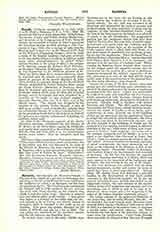

Ravalli, ANTONIO, missionary, b. in Italy, 1811; d. at St. Mary’s, Montana, U.S.A., October 2, 1884. He entered the Society of Jesus about 1833. With Fathers Vercruysse, Accolti, and Nobili, Brother Huybrechts, and six sisters of the Congregation of Notre Dame de Namur, he responded to Father de Smet’s appeal for the American mission in 1843, arriving at Fort Vancouver August 5, 1844, after a voyage of eight months. Having made a short stay at the Mission of St. Paul on the Willamet (Champoeg, Oregon), where he made a study of the English language, and gave attention to the sick (being skilled in medicine in addition to his many other accomplishments), he joined Father Adrian Hoecken in the spring of 1845 at the mission of St. Ignatius, among the Kalispel (Pend d’Oreille), on the upper Columbia, Washington. After some time he was transferred to the Flathead Mission of St. Mary’s on Bitter Root River, western Montana, where he remained until the mission was temporarily abandoned on account of the hostile Blackfeet in 1850, when, in 1844, he assumed charge of the Sacred Heart Mission established by Father Nicholas Point among the Coeur d’Alenes (Skitswish) of Northern Idaho. Here he designed and supervised the building of a handsome church which, with its altar and beautiful statues, carved by himself, has been described by a traveller as “a credit to any civilized country”. Governor Stevens, who saw it in 1855, says in his official report: “The church was designed by the superior of the mission, Father Ravalli, a man of skill as an architect and, undoubtedly, judging from his well-thumbed books, of various accomplishments”. In the general outbreak led by the Yakima in 1856-1867 his influence was largely instrumental in holding the northern tribes quiet.
In 1866 Father Congiato, superior of the Rocky Mountain missions, established the old Mission of St. Mary’s on the Bitter Root, among the Flatheads, and among those appointed to the station was Father Ravalli, who had been with it at its abandonment sixteen years before. Here he remained until his death.
His finest eulogy comes from a Protestant historian: “Fifty years a Jesuit and forty years a missionary, one of the noblest men that ever labored in the ranks of the Church in Montana, his fame stands very high in Montana, where a later generation knows more of him than even of Father de Smet” (Chittenden). (See also Flathead Indians; Kalispel Indians.)
JAMES MOONEY

